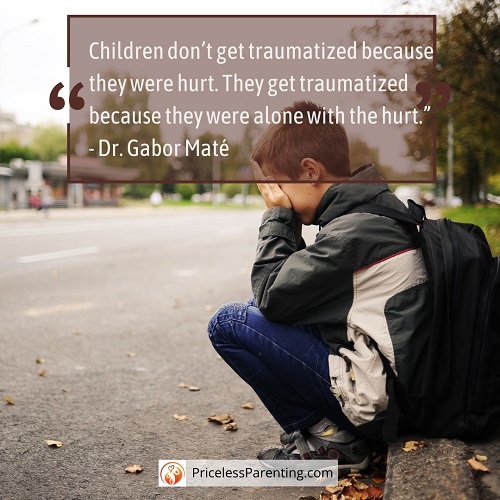Helping Kids Who Are Hurting
by Kathy Slattengren, M. Ed., Priceless Parenting (sign up for monthly parenting newsletter and receive 20+ printable charts for kids and parents)

One of the hardest things as a parent is seeing your child hurting. While you can’t prevent your kids from being hurt, you can help them through it. How you respond can help them heal or add to their pain.
Dr. Gabor Maté, a physician featured in
The Wisdom of Trauma film, emphasizes the significance of addressing pain in children. He says, “Children don’t get traumatized because they were hurt. They get traumatized because they were alone with the hurt.”
You help your kids by being there for them when they are hurting. This isn't easy because it's hard to see your children in pain.
However, when you hold space for all their feelings and experiences, you help them cope.
How is trauma experienced in kids?
Kids experience trauma when events cause intense feelings of fear, helplessness, or horror. For example, babies left alone crying for extended periods of time experience trauma. They feel helpless in getting their needs met.
There are several common ways children may experience trauma. One such exposure is through the
inadvertent viewing of pornography. With the widespread availability of internet access, children may see explicit content online. This can be distressing, leading to confusion and potential trauma as they struggle to understand and process it.
Another source of trauma is witnessing or hearing about school shootings. The prevalence of these tragic events has created an atmosphere of fear and anxiety for many kids. The thought of violence occurring in their schools – places they associate with safety and learning – can be deeply unsettling. This trauma can manifest in various ways, such as nightmares, reluctance to attend school, or heightened sensitivity to loud noises.
Conflicts between parents can also be a significant cause of trauma for children. When kids witness their parents fighting, whether or not they live in the same house, it can create a sense of instability and insecurity.
This is especially true if the conflicts are intense, frequent, or physically violent.
Children may feel caught in the middle. They may even blame themselves for their parents' conflicts. This emotional turmoil can impact their mental health and overall well-being.
What are signs and symptoms of trauma in kids?
Trauma can manifest in various ways. Understanding these indicators can help you provide the necessary support and intervention for your child's well-being. While some signs may be more apparent, others can be subtle and easily overlooked.
One of the most common signs of trauma in children is a sudden change in behavior. This may include increased irritability, mood swings, or withdrawal from social interactions. Children who have experienced trauma may also struggle with maintaining relationships, both with their peers and family members.
In addition to behavioral changes, physical symptoms can also indicate trauma. Children may complain of headaches, stomachaches, or other unexplained aches and pains. Sleep disturbances, such as nightmares or insomnia, can also be signs of underlying trauma. It is important to take these complaints seriously and consider seeking professional help if they persist.
Academic performance is another area where the effects of trauma can appear. A child who was once a high achiever may suddenly struggle to keep up with their schoolwork or lose interest in their favorite subjects. Trauma may also lead to difficulty concentrating or staying focused during class.
Lastly, be vigilant for signs of anxiety, depression, or other emotional issues in your child. These can manifest as excessive worry, feelings of guilt or shame, or emotional outbursts. In some cases, children may even exhibit self-harming behaviors or express thoughts of suicide.
How can you help your kids cope with trauma?
By providing a supportive environment and taking appropriate actions, you help your kids navigate the healing process. There are several steps you can take to help your children work through traumatic experiences.
First and foremost, create a safe and nurturing environment for your kids. This involves maintaining open communication, actively listening to your child's concerns, and validating their feelings. By doing so, you build trust and help your child feel more comfortable discussing their experiences. Providing reassurance and stability helps your child feel secure and supported.
Another essential aspect of helping your children deal with trauma is promoting healthy coping mechanisms. This may include encouraging them to
express their emotions through creative outlets, such as art, writing, or music. You can also teach relaxation techniques, such as deep breathing exercises or mindfulness practices, to help your child manage anxiety and stress. It may also be healing for your children to advocate for changes to prevent this type of trauma for others.
While you play a significant role in helping your child cope with trauma, there may be instances where seeking professional help is necessary. If your child continues to struggle with the effects of trauma despite your support,
seek professional help. Signs that you should consider seeking professional help include persistent emotional or behavioral issues, self-harming behaviors, or an inability to function in daily life.
You also need to care for yourself through these difficult times. Building a support network of friends and family members who understand what you're going through can make all the difference. You might consider connecting with other parents who have gone through similar experiences. There are many online groups dedicated specifically toward helping people heal from traumatic events.
You have the power to make a difference and help your children heal when they're hurting.
You help by providing a supportive environment, promoting healthy coping mechanisms, and seeking professional assistance when necessary.
By taking these steps, you assist them in healing and building their resilience.